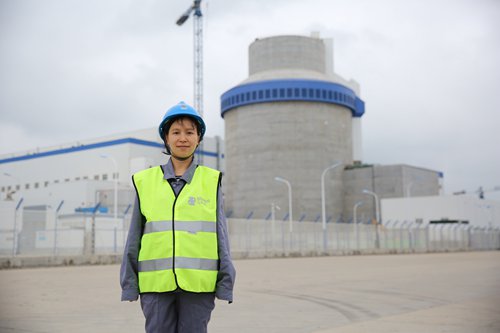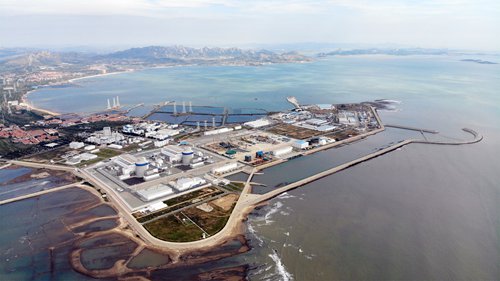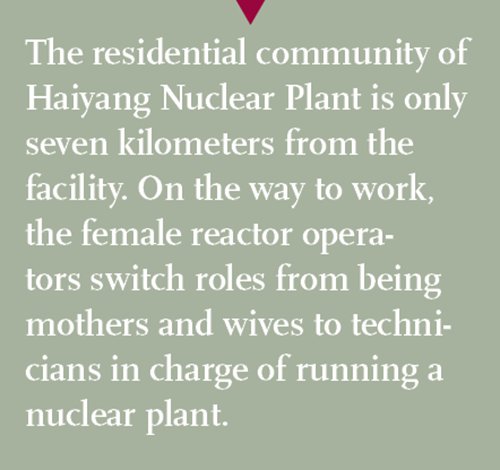Golden women
By Shan Jie Source:Global Times Published: 2019/7/9 17:38:40 Last Updated: 2019/7/9 23:31:51
Female nuclear reactor operators conquer difficulties to achieve their goals
○ In nuclear power plants, reactor operators are called "golden people"
○ Of the first 140 operators at the Haiyang Nuclear Power Plant in East China's Shandong Province, only five are women
○ "Golden women" sometimes have to overcome greater difficulties on the way to becoming qualified operators

The people who operate these control rooms are referred to as "golden people" - training an operator can cost millions of yuan, higher than training an aircraft pilot.
It also takes a great deal of time and effort. Usually, to become a "golden man" or "golden woman," one needs to have five to 10 years of work experience, gone through more than 100 courses and have passed hundreds of tests.
They also have to pass several qualification exams given by the national nuclear safety authority, and could be removed from their positions at any time.
Even after receiving their qualifications, golden people have to take requalification exams every two years. They also come under great pressure in their daily lives, as they are responsible for ensuring the safe operation of a nuclear reactor.
Due to the particular nature of the job, female nuclear reactor operators are extremely rare in the industry.
In Haiyang Nuclear Power Plant in East China's Shandong Province, only five out of the first 140 certified operators are women, and they are called the "Five Golden Flowers."
Each of them has had to encounter various difficulties on the way to becoming an operator, and each has an inspiring story to tell.
Setting a goal
Xu Jingfan, 37, is one of these "golden flowers," and also a mother of two.
Her children grew up accompanying Xu on her difficult journey to realizing her dream of becoming a reactor operator.
Xu was born in a small village in Baoding, North China's Hebei Province. Her father was a teacher and her mother was a housewife. Her school life went smoothly, but she understood that everyone would encounter difficulties in their lives.
After graduating from Baoding-based North China Electric Power University in 2005, Xu decided to see the outside world and went to Haiyang, a small coastal city in Shandong, where she started working for Shandong Nuclear Power Company Ltd.

From 2007 to 2010, Xu received training for her operator qualifications at the Qinshan Nuclear Power Plant in East China's Zhejiang Province. China's first nuclear power unit, Qinshan 1, was integrated into the national grid network in 1991.
It was in Qinshan that Xu made up her mind to become an operator. In Qinshan, along with many colleagues with the same dream, Xu worked hard day and night. Finally, in March 2009, she readily passed the qualification exam to become an operator at Qinshan unit 1.
After that, Xu went back to the company in Haiyang and was given the responsibility for training and experience feedback work. But she never gave up her dream of operating the reactor at Haiyang Nuclear Power Plant.
Big challenge
It was at this time that Xu met her husband Miao Weidong, who was also an outstanding employee at the power plant. Miao has always supported her work, and is considered a hero by Xu.
As Xu was still waiting to take the operator qualification exam, the couple's plans to have a baby had to be postponed several times. In May 2014, Xu found that she was pregnant.
Doctors told her the baby was due on January 13, 2015. However, several days after the couple got the good news, they were told that the written test for operator qualification had been set for exactly the same date.
Hearing the news, Xu felt that her 10 years of efforts preparing for the test would come to nothing.
Miao reassured Xu, telling her that he supported her in taking the exam.
"I will take care of everything at home. You just focus on studying and the safety of our baby. Whether you take the exam in the end, we will have no regrets," Miao said.
The words were exactly what Xu needed to hear at that time. She made up her mind to take the exam.

On January 11, the day before the written exam, Xu went to hospital for a check-up, and was found to be in an unstable condition. The doctor told her to stay in the hospital for further observation.
Xu told the doctor about the important exam she was to take the next day, and begged the doctors to allow her to go home.
Finally, on January 12 and 13, Xu entered the exam room she had been dreaming of for so long and completed an eight-hour exam. Fortunately, the baby was very quiet during the whole process, and Xu was able to complete the 80 pages of exam papers.
Out of consideration for Xu's safety, the power plant had an ambulance on standby outside the exam room and allowed Miao to wait outside.
The same afternoon, Xu was permitted by the National Nuclear Safety Administration to take the oral test.
After the exams, Xu was immediately taken to the hospital. On January 14, she gave birth to a baby girl, who she considers her lucky star.
After having the baby, Xu was very weak, and felt "like a 90-year-old grandma." However, she still had to continue taking her exams, and finally became qualified to be a senior operator.
Now, Xu and Miao are the parents of two children. Xu said that she will tell her children about their journey together and support them to fight for their dreams whatever difficulties they may face.
No regrets
The four other female reactor operators have also tackled various difficulties in their work and daily lives.
Zheng Xuexia and her husband Wu Hao are both reactor operators in Haiyang. Their son Dingdang was born in September 2014. Colleagues joked that the baby would be able to operate a reactor as soon as he was born.
Zhou Ting is praised by her colleagues as being "full of energy and positive powers."
Wang Ping said she has overcome so many mental and physical difficulties and wants to set an example for her young son.

Their stories are rarely told, but none of them have any regrets in taking the path to becoming "golden women."

○ Of the first 140 operators at the Haiyang Nuclear Power Plant in East China's Shandong Province, only five are women
○ "Golden women" sometimes have to overcome greater difficulties on the way to becoming qualified operators

Xu Jingfan, a reactor operator Haiyang Nuclear Power Plant, poses in Haiyang Nuclear Power Plant in East China's Shandong Province. Photo: Courtesy of Haiyang Nuclear Power Plant
In a nuclear power plant, the reactor control room is considered the brain of the entire facility.The people who operate these control rooms are referred to as "golden people" - training an operator can cost millions of yuan, higher than training an aircraft pilot.
It also takes a great deal of time and effort. Usually, to become a "golden man" or "golden woman," one needs to have five to 10 years of work experience, gone through more than 100 courses and have passed hundreds of tests.
They also have to pass several qualification exams given by the national nuclear safety authority, and could be removed from their positions at any time.
Even after receiving their qualifications, golden people have to take requalification exams every two years. They also come under great pressure in their daily lives, as they are responsible for ensuring the safe operation of a nuclear reactor.
Due to the particular nature of the job, female nuclear reactor operators are extremely rare in the industry.
In Haiyang Nuclear Power Plant in East China's Shandong Province, only five out of the first 140 certified operators are women, and they are called the "Five Golden Flowers."
Each of them has had to encounter various difficulties on the way to becoming an operator, and each has an inspiring story to tell.
Setting a goal
Xu Jingfan, 37, is one of these "golden flowers," and also a mother of two.
Her children grew up accompanying Xu on her difficult journey to realizing her dream of becoming a reactor operator.
Xu was born in a small village in Baoding, North China's Hebei Province. Her father was a teacher and her mother was a housewife. Her school life went smoothly, but she understood that everyone would encounter difficulties in their lives.
After graduating from Baoding-based North China Electric Power University in 2005, Xu decided to see the outside world and went to Haiyang, a small coastal city in Shandong, where she started working for Shandong Nuclear Power Company Ltd.

An aerial view of Haiyang Nuclear Power Plant in East China's Shandong Province Photo: Courtesy of Haiyang Nuclear Power Plant
Later, Xu was sent to different parts of China for training, including East China's Shanghai, Zhejiang Province and Southwest China's Sichuan Province. She also visited nuclear power plants in the US.From 2007 to 2010, Xu received training for her operator qualifications at the Qinshan Nuclear Power Plant in East China's Zhejiang Province. China's first nuclear power unit, Qinshan 1, was integrated into the national grid network in 1991.
It was in Qinshan that Xu made up her mind to become an operator. In Qinshan, along with many colleagues with the same dream, Xu worked hard day and night. Finally, in March 2009, she readily passed the qualification exam to become an operator at Qinshan unit 1.
After that, Xu went back to the company in Haiyang and was given the responsibility for training and experience feedback work. But she never gave up her dream of operating the reactor at Haiyang Nuclear Power Plant.
Big challenge
It was at this time that Xu met her husband Miao Weidong, who was also an outstanding employee at the power plant. Miao has always supported her work, and is considered a hero by Xu.
As Xu was still waiting to take the operator qualification exam, the couple's plans to have a baby had to be postponed several times. In May 2014, Xu found that she was pregnant.
Doctors told her the baby was due on January 13, 2015. However, several days after the couple got the good news, they were told that the written test for operator qualification had been set for exactly the same date.
Hearing the news, Xu felt that her 10 years of efforts preparing for the test would come to nothing.
Miao reassured Xu, telling her that he supported her in taking the exam.
"I will take care of everything at home. You just focus on studying and the safety of our baby. Whether you take the exam in the end, we will have no regrets," Miao said.
The words were exactly what Xu needed to hear at that time. She made up her mind to take the exam.

Xu Jingfan, a reactor operator Haiyang Nuclear Power Plant, is with her husband and newborn baby. Photo: Courtesy of Haiyang Nuclear Power Plant
Before the exam, Xu worked in the day and studied at night. Due to her pregnancy, she had to lay in bed to study until midnight. Sometimes, she was so tired she fell asleep, and continued studying when she woke up.On January 11, the day before the written exam, Xu went to hospital for a check-up, and was found to be in an unstable condition. The doctor told her to stay in the hospital for further observation.
Xu told the doctor about the important exam she was to take the next day, and begged the doctors to allow her to go home.
Finally, on January 12 and 13, Xu entered the exam room she had been dreaming of for so long and completed an eight-hour exam. Fortunately, the baby was very quiet during the whole process, and Xu was able to complete the 80 pages of exam papers.
Out of consideration for Xu's safety, the power plant had an ambulance on standby outside the exam room and allowed Miao to wait outside.
The same afternoon, Xu was permitted by the National Nuclear Safety Administration to take the oral test.
After the exams, Xu was immediately taken to the hospital. On January 14, she gave birth to a baby girl, who she considers her lucky star.
After having the baby, Xu was very weak, and felt "like a 90-year-old grandma." However, she still had to continue taking her exams, and finally became qualified to be a senior operator.
Now, Xu and Miao are the parents of two children. Xu said that she will tell her children about their journey together and support them to fight for their dreams whatever difficulties they may face.
No regrets
The four other female reactor operators have also tackled various difficulties in their work and daily lives.
Zheng Xuexia and her husband Wu Hao are both reactor operators in Haiyang. Their son Dingdang was born in September 2014. Colleagues joked that the baby would be able to operate a reactor as soon as he was born.
Zhou Ting is praised by her colleagues as being "full of energy and positive powers."
Wang Ping said she has overcome so many mental and physical difficulties and wants to set an example for her young son.

The residential community of Haiyang Nuclear Plant is only seven kilometers from the facility. On the way to work, the female reactor operators switch roles from being mothers and wives to technicians in charge of running a nuclear power plant.
Their stories are rarely told, but none of them have any regrets in taking the path to becoming "golden women."

RELATED ARTICLES: